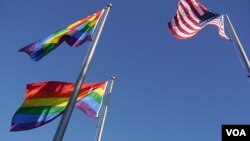A human rights group says many U.S. public schools remain hostile to lesbian, gay, bisexual and transgender students.
Human Rights Watch says the students are often subjected to bullying, harassment and bigotry from classmates and school officials based on the students' sexual orientation and gender identity.
The rights group said Wednesday it interviewed more than 350 students and 145 parents, teachers and administrators in five geographically diverse U.S. states — Alabama, Pennsylvania, South Dakota, Utah and Texas — that are among 31 U.S. states that do not have anti-bullying or anti-discrimination laws specifically for LGBT students.
The rights group said that the anti-LGBT bullying took on many forms, including physical violence, sexual assault, verbal harassment, cyberbullying and exclusion from school groups.
Previous studies
While the HRW report did not cite specifics, a 2015 online study by the Gay, Lesbian and Straight Education Network (GLSEN), an anti-bullying group, found nearly three-quarters (73.9 percent) of students reported personally experiencing some type of peer victimization in the past school year. The report found the peer victimization included having mean rumors or lies told about them at school (54.8 percent), property damage (38.9 percent), cyberbullying (33.8 percent), and sexual harassment (28.8 percent).
That poll was conducted of 1,367 U.S. secondary school (middle or high school grades) students age 13-18, and 1,015 U.S. secondary school teachers.
A 2016 study by the federal government, titled the Youth Risk Behavior Study, found that 8 percent of students who identified as lesbian, gay or bisexual nationally experienced higher rates of depression and suicidality than their heterosexual peers.
The study also found that 42.8 percent of lesbian, gay, and bisexual youth respondents had seriously considered suicide in the previous year, and 29.4 percent had attempted suicide, compared with 14.8 percent of heterosexual youths who had seriously considered suicide in the previous year and 6.4 percent of heterosexual youths who had attempted suicide.
The national YRBS is conducted every two years during the spring semester and provides data representative of ninth- through 12th-grade students in public and private U.S. schools.
Insults, attacks reported
"In every state we visited, we heard stories of students who were insulted, cyber-bullied or attacked, and teachers who allowed discrimination and harassment because they see it as normal behavior," said Ryan Thoreson, a fellow in the Human Rights Watch’s LGBT rights program.
The report released Wednesday said that students in same-sex relationships were barred or discouraged from attending school events as a couple, while transgender students were denied access to facilities, classes and school activities because of their gender identity.
Human Rights Watch called for enactment of laws to ensure schools are more inviting, including sexual education that is "medically and scientifically accurate," and inclusive of LGBT youths.




